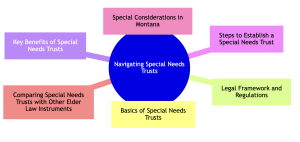
Montana Probate Laws: An Overview for Beneficiaries and Executors
January 17, 2024
Understanding Elder Law: A Comprehensive Guide for Seniors and Their Families
January 17, 2024Understanding Special Needs Trusts
Special needs trusts are vital tools in elder law, designed to provide financial security and care for seniors with disabilities. These trusts ensure that individuals with special needs can access the resources they need without jeopardizing their eligibility for essential government benefits like Medicaid or Supplemental Security Income (SSI). This comprehensive guide aims to demystify special needs trusts, offering valuable insights for seniors and their families to navigate this crucial aspect of elder care planning.
Key Takeaways:
- Special needs trusts protect assets while maintaining eligibility for government aid.
- They offer flexibility to cater to the unique needs of each beneficiary.
- Understanding the legal framework is essential for effective planning.
- These trusts are crucial for ensuring long-term care and financial security for seniors with disabilities.
The Basics of Special Needs Trusts
Special needs trusts are legal arrangements that manage assets for the benefit of an individual with disabilities. They are designed to provide financial support without disqualifying the beneficiary from government programs like Medicaid and SSI. These trusts come in various forms, each tailored to meet specific needs and circumstances.
Table 1: Types of Special Needs Trusts and Their Features
| Type of Trust | Source of Funding | Key Features | Ideal For |
| First-Party Trust | Beneficiary’s assets (e.g., inheritance, settlement) | Managed by a trustee; used for the beneficiary’s benefit without affecting government aid eligibility | Individuals who have received a windfall or personal assets |
| Third-Party Trust | Family members or other third parties | No Medicaid payback required; assets used for beneficiary’s benefit | Families planning for the future care of a loved one with special needs |
| Pooled Trust | Multiple beneficiaries’ assets, managed by a non-profit organization | Professional management; combines resources for investment and care purposes | Individuals with limited assets or those seeking professional trust management |
Legal Framework and Regulations
The legal framework governing special needs trusts is a blend of federal and state laws. These laws dictate how trusts can be established, managed, and utilized, ensuring they serve the beneficiary’s best interests while complying with legal requirements.
Federal Regulations:
- Medicaid Payback Provision: For first-party special needs trusts, any remaining assets after the beneficiary’s death are typically used to reimburse Medicaid for the care provided.
- Age Limitations: Individuals must generally be under 65 when a first-party trust is established.
- Disability Requirements: Beneficiaries must meet specific disability criteria as defined by the Social Security Administration.
State-Specific Regulations in Montana:
- Montana Trust Code: This code governs the creation and administration of trusts within the state, including special needs trusts.
- Medicaid Eligibility: Montana has specific guidelines on how trusts affect Medicaid eligibility. These guidelines must be carefully considered when setting up a trust to ensure it does not adversely impact the beneficiary’s eligibility for government programs.
Key Benefits of Special Needs Trusts
Special needs trusts offer myriad benefits, crucial for the financial and personal well-being of seniors with disabilities. These trusts safeguard assets and ensure that beneficiaries continue to receive the government benefits they rely on. The strategic use of these trusts can significantly enhance the quality of life for individuals with special needs by providing for additional care, services, and support that government programs may not cover.
Benefits of Establishing a Special Needs Trust:
- Asset Protection: Shields the beneficiary’s assets from being counted towards eligibility limits for government aid.
- Preservation of Government Benefits: Ensures continued access to vital programs like Medicaid and SSI.
- Enhanced Quality of Life: Funds can be used for various life-enhancing expenses not covered by government benefits, such as personal care attendants, out-of-pocket medical expenses, education, travel, and recreation.
- Peace of Mind for Families: Provides assurance that their loved one with special needs will be financially secure and well-cared for in the future.
- Flexibility and Control: Allows for the appointment of a trusted trustee to manage the trust assets and make distributions based on the beneficiary’s needs.
Steps to Establish a Special Needs Trust
Establishing a special needs trust involves several critical steps, each requiring careful consideration and planning. It begins with determining the type of trust that best suits the beneficiary’s needs, followed by drafting a trust document that complies with legal requirements. The choice of a trustee is a pivotal decision, as this individual or entity will be responsible for managing the trust and making distributions for the benefit of the person with special needs. (1)
Step-by-Step Process to Establish a Special Needs Trust:
- Determine the Type of Trust: Choose between a first-party, third-party, or pooled trust based on the source of funding and the beneficiary’s circumstances.
- Draft the Trust Document: Work with an experienced attorney to create a legally compliant trust document that outlines the terms and conditions of the trust.
- Select a Trustee: Choose a reliable and trustworthy individual, professional, or organization to manage the trust.
- Fund the Trust: Transfer assets into the trust. This can include cash, investments, real estate, or other valuable assets.
- Develop a Trust Plan: Outline how the trust funds will be used to meet the beneficiary’s needs.
- Regular Review and Adjustment: Periodically review the trust to ensure it continues to meet the beneficiary’s changing needs and remains compliant with current laws.
Special Considerations in Montana
Montana’s Legal Landscape for Special Needs Trusts
In Montana, navigating the legal terrain of special needs trusts requires a keen understanding of state-specific regulations.
The Montana Trust Code, a comprehensive legal framework, sets forth the guidelines for creating and administrating these trusts. It ensures that each trust is structured to meet the stringent state standards, effectively serving each beneficiary’s unique needs.
This code covers various aspects, from the designation of trustees to the permissible uses of trust funds, ensuring that every trust established under its jurisdiction is robust, compliant, and tailored to provide the utmost benefit to the individual with special needs.
For families and caregivers in Montana, familiarizing themselves with these nuances is not just a legal obligation but a step towards securing the best possible care and financial management for their loved ones.
Impact on Medicaid Eligibility in Montana
Regarding Medicaid eligibility in Montana, special needs trusts play a pivotal role. The state’s Medicaid program, which offers essential health coverage to many seniors and individuals with disabilities, has specific criteria regarding trusts and asset limits.
Understanding these rules is crucial for anyone establishing a special needs trust. A misstep in trust creation or administration can inadvertently affect a beneficiary’s eligibility for Medicaid, potentially leading to a loss of vital healthcare benefits.
Trustees, therefore, must be vigilant in managing trust assets, ensuring that distributions and expenditures align with Medicaid’s guidelines. This careful balancing act ensures that beneficiaries retain their much-needed Medicaid coverage while still benefiting from the financial resources held in their trust.
Resources and Support in Montana
Montana is proactive in providing resources and support for those setting up special needs trusts. The state offers a network of legal aid organizations, financial advisors, and non-profit groups, all specializing in special needs planning.
These entities are equipped to guide individuals through the intricate process of trust creation and management. Legal aid organizations offer invaluable advice on complying with state laws, while financial advisors can assist in asset management and planning for the trust’s long-term viability. Non-profit groups often provide educational resources and personalized assistance, helping families understand the full scope of benefits and responsibilities that come with a special needs trust.
This supportive ecosystem in Montana ensures that families and individuals have access to the expertise and guidance needed to establish trusts that are not only legally sound but also aligned with their specific care and financial goals.
Comparing Special Needs Trusts with Other Elder Law Instruments
Special needs trusts are just one component of a comprehensive elder law strategy. Comparing them with other instruments can provide a clearer understanding of their unique role in elder care planning.
Table 2: Special Needs Trusts vs. Other Elder Law Instruments
| Instrument | Purpose | Benefits | Limitations |
| Special Needs Trusts | Manage assets for individuals with disabilities | Protects eligibility for government benefits; tailored to individual needs | Requires careful legal setup and management |
| Traditional Trusts | Manage and distribute assets after death | Flexibility in asset distribution; can reduce estate taxes | Does not specifically cater to individuals with disabilities |
| Guardianships | Provide for the personal and financial affairs of an incapacitated individual | Offers protection and oversight for those unable to make decisions | Can be restrictive; involves ongoing court oversight |
| Powers of Attorney | Authorize an individual to make decisions on behalf of another | Provides control over who makes decisions if incapacitated | Does not provide for financial needs specific to disabilities |
Final Thoughts: The Strategic Role of Special Needs Trusts in Elder Care
Special needs trusts are pivotal in the landscape of elder law, offering a structured approach to managing the financial needs of seniors with disabilities. These legal tools go beyond mere asset management; they provide a framework for ensuring that individuals with special needs can enjoy a quality of life that might otherwise be out of reach. These trusts play a critical role in elder care planning by safeguarding assets while maintaining eligibility for essential government benefits. They offer a unique solution that balances financial security with the need for ongoing care and support, making them an indispensable part of future planning for families.
For those in Montana, navigating the complexities of special needs trusts underscores the value of expert legal guidance. Montana Elder Law stands as a resource for families seeking to navigate this intricate area of law. Their expertise in both federal and Montana-specific legal aspects of special needs trusts makes them an ideal partner in this journey. Learn more!
With their guidance, families can craft a trust that not only meets legal requirements but also aligns with the personal needs and goals of their loved ones. In the realm of elder law, the creation of a special needs trust is a decision that resonates with foresight and care, ensuring that seniors with special needs are supported both now and in the future.
Reference:
(1) Understanding a Special Needs Trust and Its Benefits, JULIA KAGAN, https://www.investopedia.com/terms/s/special-needs-trust.asp#:~:text=A%20special%20needs%20trust%20is,(SSI)%2C%20or%20Medicaid.


